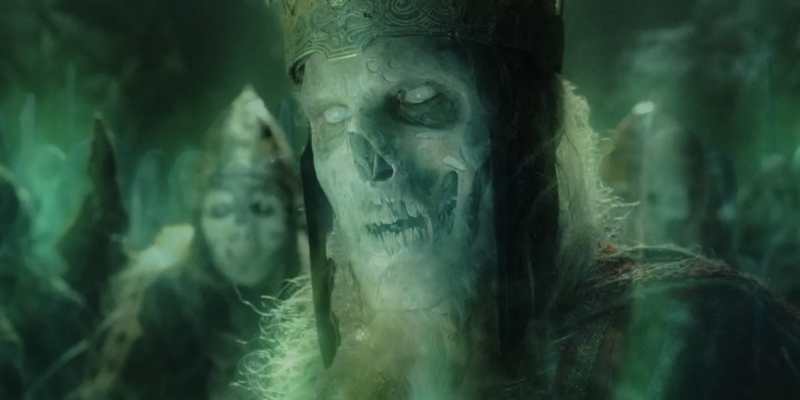To mark the 20th anniversary of the Lord of the Rings movie trilogy, we’re publishing a trio of articles this week looking at the films. This is the last of the three, discussing The Return of the King and the notion of endings, with the previous two discussing Peter Jackson and the significance of The Two Towers. We hope you’ve enjoyed the look back as much as we have.
One of the big recurring criticisms of The Return of the King is that the film has too many endings.
Jack Nicholson walked out of the movie early, later complaining to Elijah Wood that there “were too many damn endings.” At the Academy Awards, Billy Crystal noted that the film received eleven nominations — “one for each ending.” Brett White argues that Crystal is slightly exaggerating, putting the actual ending count at six. Co-writer Philippa Boyens has even weighed in, acknowledging more than a decade later that those on the production team still “get a lot of flak for the multiple endings.”
However, all of this loses sight of one of the more interesting aspects of the entire Lord of the Rings trilogy. The three films, and the three books on which they are based, are effectively one gigantic ending. The entire trilogy is built around the idea that Middle-earth is ending and that, no matter what the heroes accomplish, everything that they build will eventually fade into memory and myth – and perhaps be forgotten entirely. The trilogy has a morbid and funereal tone.
This is obvious, even just thematically. “Much that once was is lost, for none now live who remember it,” Galadriel (Cate Blanchett) tells the audience in her opening monologue. There’s a mournfulness there, a sense of loss from the very beginning. The Lord of the Rings is built upon the idea that the past is gone, and it cannot be restored. In many ways, this feels like the last great tale of this world.

The three films are populated with caves and graves. In The Fellowship of the Ring, Gimli (John Rhys-Davies) promises the party a warm welcome in the Mines of Moria. When they arrive, they find only decaying bodies waiting for them. “This is no mine,” remarks Boromir (Sean Bean). “This is a tomb.” The most unsettling detail is left unspoken — that an entire dwarven kingdom could have been brutally murdered and nobody noticed. The bodies look to have been there a while.
In The Return of the King, Aragorn (Viggo Mortensen) leads a party into the caves beneath Dwimorberg to recruit the literal ghost army of the Dead Men of Dunharrow. These specters have haunted the caves for thousands of years, bound by an oath that they broke to Aragorn’s ancestor. They fulfill that oath by coming to Gondor’s aid during the battle for Minas Tirith. However, Aragorn does not restore them to life. He instead releases them into oblivion, to non-existence.
In the extended cut of The Fellowship of the Ring, Frodo Baggins (Elijah Wood) and Samwise Gamgee (Sean Astin) encounter a group of migrating elves before they have even left the Shire. Elrond (Hugo Weaving), the half-elven Lord of Rivendell, concedes that “the time of the elves is over” and that they are leaving Middle-earth forever. These are early waves of the migration that Frodo will undertake with Bilbo (Ian Holm) and Gandalf (Ian McKellen) at the end of The Return of the King.
J.R.R. Tolkien was an inherently nostalgic writer. According to his biographer Humphrey Carpenter, Tolkien hated the French at least in part because the Norman invasion of England, in 1066, “pained him almost as much as if it had happened in his own lifetime.” He loathed technology, seeing it as a tool used primarily for “bulldozing the real world.” Novelist Stephen R. Donaldson has discussed how Tolkien’s work seems filtered through a “nostalgic patina.”

Many critics and commentators have framed this funereal tone through the lens of Tolkien’s Catholicism and his belief in the inevitability of “the Fall of Man,” summarized by Susana Polo as his belief that “history is a story of decline, not progress.” The result of this is an interesting tension within The Lord of the Rings. Nothing Frodo or Gandalf can do will restore Middle-earth to its past glory or halt the inevitable decline of the world around them.
While there’s an obvious yearning for a lost and imagined past at work in The Lord of the Rings, there is something more interesting at play as well. Many of these sorts of stories are rooted in the idea that the past can be recreated or reinvigorated. A lot of traditional and classical fantasy can be openly nostalgic for a past that never really existed, inviting the reader to imagine a more innocent or more idyllic time when the world was simpler and magic existed.
In contrast, the idea of death and finality is woven into The Lord of the Rings. In the Mines of Moria, Gandalf counsels Frodo, “All we have to decide is what to do with the time that is given us.” During the battle for Minas Tirith, Pippin (Billy Boyd) confronts his mortality. Gandalf reassures him that “death is just another path, one we must all take.” It is inevitable and inescapable, and it cannot be cheated. The extension of Gollum’s (Andy Serkis) life has turned him into a monster.
The true tragedy in The Lord of the Rings is not death, but the idea that children might die before their parents. This fits with the reading of The Lord of the Rings as a story shaped by Tolkien’s experience of the First World War and perhaps even as a father whose children served during the Second World War. The Lord of the Rings understands that there are few possibilities as horrifying to a parent as outliving their own children.

King Théoden (Bernard Hill) buries his son in The Two Towers, lamenting that “the young perish and the old linger.” He warns Gandalf, “No parent should have to bury their child.” Treebeard (Rhys-Davies) is motivated to lead the Ents to war when he witnesses the destruction of trees he had known “from nut or acorn.” In The Return of the King, Denethor II (John Noble), the Steward of Gondor, is driven mad upon hearing of the death of his son Boromir.
Repeatedly in The Lord of the Rings, the older generations fail the young. Saruman the White (Christopher Lee) betrays his obligations to the world of men and sides with ancient evil Sauron (Alan Howard). Under Saruman’s influence, King Théoden refuses to listen to the counsel of his nephew Éomer (Karl Urban). As the battle for Minas Tirith takes a turn for the worse, Denethor II tries to immolate himself and his unconscious younger son Faramir (David Wenham).
Instead, hope often lies with the children. Frodo is nephew to Bilbo, the protagonist of The Hobbit. The Fellowship of the Ring begins with Bilbo marking his 111th birthday, just literally finishing the telling of his own story in “There and Back Again.” Bilbo takes the occasion to disappear from public life, first by using the ring on stage to turn invisible and then by departing to Rivendell without telling anyone. This is no longer Bilbo’s story. Instead, it belongs to Frodo.
These choices temper the nostalgia that runs through The Lord of the Rings. Like a lot of epic fantasy, The Lord of the Rings conjures an illusory and imagined past into being. Tolkien clearly yearns for the simplicity and the romance of the Shire. However, there’s also an understanding that change is inevitable and inescapable. It is necessary and healthy. From its opening moments, The Lord of the Rings understands that everything ends. There is a certain tragedy in that. There is also a majesty.
